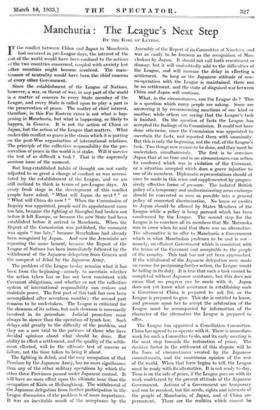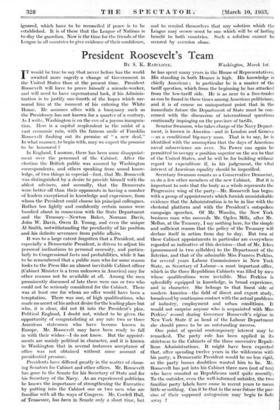Manchuria : The League's Next Step By THE EARL OF
LYTTON.
IF the conflict between China and Japan in Manchuria had occurred in pre-League days, the interest of the rest of the world would have been confined to the actions of the two countries concerned, coupled with anxiety lest other countries might become involved. The main- tenance of neutrality would have been the chief concern of every other Government.
Since the establishment of the League of Nations, however, a war, or threat of war, in any part of the world is a matter of concern to every State member of the League, and every State is called upon to play a part in the preservation of peace. The matter of chief interest, therefore; in this Far Eastern crises is not what is hap- pening in Manchuria, but what is happening, or likely to happen, in Geneva. It is not the action of China or Japan, but the action of the League that matters. What makes-this conflict so grave is the strain which it is putting on the post-War organization of international relations. The principle of the collective responsibility for the pre- servation of peace in the world is at stake. Will it survive the test of so difficult a task ? That is the supremely anxious issue of the moment.
But • long-established habits of thought arc not easily adjusted to so great a change of conduct as was necessi- tated by the establishment of the League, and we are still inclined to think in terms of pre-League days. At every fresh stage in the development of this conflict people have asked, " What will Japan do next ? " or " What will China do now ? " When the Commission of Inquiry was appointed, people said its appointment came too late, because the fighting at Shanghai had broken out before it left Europe, or because the new State had been established before it arrived in Manchuria. When the Report of the Commission was published, the comment was again " too late," because Manchukuo had already been recognized by Japan. And now the Jeremialis are repeating the same lament, because the Report of the League of Nations has been immediately followed by the withdrawal of the Japanese delegation from Geneva and the conquest of Jehol by the Japanese Army.
• The problem of the League to-day remains what it has been from the beginning—namely, to ascertain whether the action taken- has or has not been consistent with Covenant obligations, and whether or not the collective system of international responsibility can restore and maintain peace. The first part of this task has now been accomplished after seventeen months ; the second part remains to be undertaken. The League is criticized for the slowness of its action, but such slowness is necessarily involved in its procedure. Judicial procedure must always be slower than the operation of lynch law. Such delays add greatly" to the difficulty of the problem, and they are a sore trial to the patience of those who have decided opinions about what should be done. But ability to effect a settlement, and the quality of the settle- ment effected, will be the ultimate test of success or failure, not the time taken to bring it about.
The fighting in Jehol, and the easy occupation of that Province by the Japanese Army, has no more significance than any of the other military operations by which the other three Provinces passed under Japanese controL It will have no more effect upon the ultimate issue than the occupation of Kirin or Ileilungkiang. The withdrawal of the Japanese delegation from further participation in the League discussions of the problem is of more importance. It was an inevitable result of the acceptance by the Assembly of the Report of its Committee of Nineteen, and was as easily to be foreseen as the recognition of Man- chukuo by Japan. It should not call forth resentment or dismay, but it will undoubtedly add to the difficulties of the League, and will increase the delay in effecting a settlement. So long as the Japanese attitude of non- co-operation with the League is maintained, there can be no settlement, and the state of disguised war between China and Japan will continue.
What, in the circumstances, can the League do ? This is a question which many people are asking. Some are answering it by recommending sanctions of one kind or another, while others are saying that the League's task is finished. On the question of facts the League has accepted the findings of its Commission. It could not have done otherwise, since the Commission was appointed to ascertain the factS, and reported them with unanimity. But this is only the beginning, not the end, of the League's task. Two things now remain to be done, and they must be undertaken simultaneously. The first is to • convince Japan that at no time and in no circumstances can action be condoned which was in violation of the Covenant, or a situation accepted which does a grave injustice to one of its members. Diplomatic representations should at once be made in this sense and supplemented by progres- sively effective forms of pressure. The isolated British policy of a temporary and undiscriminating arms embargo should be converted as soon as possible into a general policy of concerted discrimination. No loans or credits to Japan should be allowed by States Members of the League while a policy is being pursued which has been condemned by the League. The second step for the League is to convince all its members that Mr. Matsuoka was in error when he said that there was no alternative. The alternative is to offer to Manchuria a Government which is what Manchukuo professes to be and is not— namely, an efficient Government which is consistent with the terms of the Covenant and acceptable to the people of the country. This task has not yet been approached. If the withdrawal of the Japanese delegation were made an excuse for postponing further action, the League would he failing in its duty. It is true that such a task cannot be completed without Japanese assistance, but this does not mean that no progress can be made with it. Japan does not yet know what assistance in establishing such -a Government China is prepared to ask for, or the League is prepared to give. This she is entitled to know, and pressure upon her to accept the arbitration of the League must be accompanied by information of the character of the alternative the League is prepared to offer.
The League has appointed a Conciliation Committee. China has agreed to co-operate with it. There is immediate work for such a Committee to do, and its early meeting is the next step towards the restoration of peace. The decisive factor in the settlement of this dispute will be the force of circumstances created by the Japanese commitments, and the unanimous opinion of the rest of the World. When that force begins to tell, the League must be ready with its alternative. It is not ready to-day. Time is on the side of peace, if the League goes on with its work undeterred by the present attitude of the Japanese Government. Actions of a Government arc temporary and can be revoked, but the needs, rights and interests of the people of Manchuria, of Japan, and of China are permanent. These are the realities which cannot be ignored, which have to be reconciled if peace is to be established. It is of these that the League of Nations is to-day the guardian. Now is the time for the friends of the. League in all countries to give evidence of their confidence, and to remind. themselves that any solution which the League mai, secure must be one which will be of lasting benefit to 'both' countries. Such a solution cannot be secured by coercion alone.







































 Previous page
Previous page